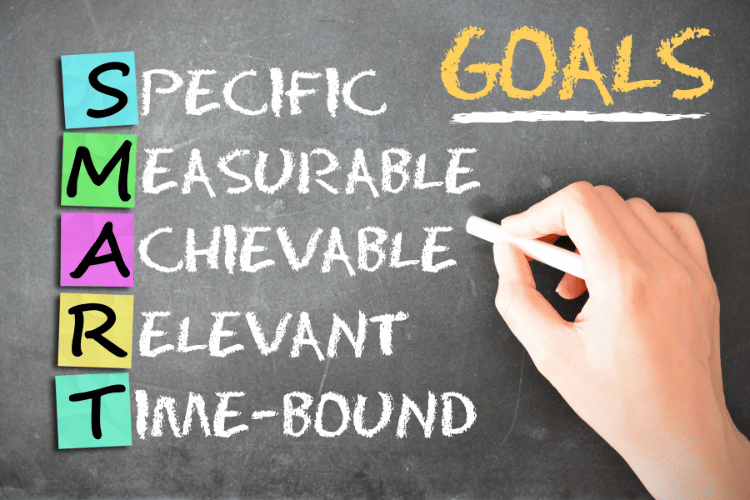Whether related to self-improvement or business, experts always recommend setting life goals, but how many people actually do? How does setting goals lead to success anyways?
Setting goals gives you a clear roadmap to follow, guiding you with purpose and direction toward your aspirations. Regardless of your intention, goal setting can be your secret weapon.
In this article, we’ll explore the importance of goal setting and how it can push you to succeed in life. So, keep scrolling.

Understanding Goals and Goal Setting
Goals are the inspiring dreams and aspirations we have in life. Goal-setting is the process of turning these dreams into actionable plans.
That said, goal setting isn’t the same as wishful thinking. Setting goals involves creating well-defined objectives with a concrete plan of action. Wishful thinking lacks the specificity and actionable steps required to transform desires into tangible achievements.
Generally, there are various types of goals that a person can set in their life, each serving different purposes. Some of the most common include:
- Short-Term Goals: These are smaller, achievable objectives that you can accomplish in the near future, typically within a few weeks or months.
- Long-Term Goals: Long-term goals are more significant and require a longer time frame to achieve, often spanning several months or years.
- Career Goals: Goals related to professional development, such as achieving a specific position, earning a promotion, or acquiring new skills.
- Educational Goals: These revolve around academic achievements, like completing a degree, obtaining certifications, or mastering a particular subject.
- Financial Goals: These goals relate to managing money and achieving financial stability, such as saving a certain amount, paying off debts, or investing.
- Health and Fitness Goals: They’re goals to improve physical health and wellness, such as losing weight, exercising regularly, or adopting a healthier lifestyle.
- Relationship Goals: These types of goals focus on improving and nurturing personal relationships, whether with family, friends, or a partner.
- Personal Development Goals: These aim to enhance personal skills, confidence, and overall self-improvement.
- Travel Goals: These goals align with exploring new places, experiencing different cultures, or fulfilling travel-related dreams.
What Are the Benefits of Goal Setting?
Goals provide us with a sense of direction and purpose, acting as a driving force to push us forward. Here are seven of the most important goal-setting benefits.
- Increased Clarity and Direction: Setting clear goals provides a sense of direction and purpose by offering a lucid destination. Specific objectives guide decision-making and actions, ensuring alignment with desired outcomes.
- More Motivation and Commitment: Goals serve as a driving force, empowering individuals to persist through challenges and setbacks. They also keep people dedicated to their aspirations and pushing toward success.
- Measurable Progress: Goal setting allows you to measure progress and track achievements. Moreover, celebrating milestones reinforces confidence, providing a sense of accomplishment and encouraging further efforts to reach more goals.
- Increased Accountability and Responsibility: Setting goals fosters responsibility by creating a commitment to personal development. It encourages you to take ownership of your actions and decisions, making deliberate choices that align with your objectives.
- Enhanced Balance and Personal Growth: Goal setting provides a balanced and fulfilling life by directing your efforts towards personal growth. It nurtures continuous development, enabling you to prioritize achievements.
- Improved Focus and Time Management: Setting goals enhances focus by providing a clear target, reducing distractions, and maintaining a clear vision. It improves time management and prioritization skills, helping you allocate resources effectively.
- Better Resilience and Adaptability: Goal setting encourages you to adjust your strategies when facing challenges. It fosters a mindset that embraces change, enabling you to bounce back stronger and stay on track despite tough circumstances.
How To Set Goals: The SMART Goal-Setting Framework
When it comes to an effective goal-setting process, the SMART approach is a tried-and-true method proven to yield remarkable results.

Primarily, the letters in “SMART” stand for Specific, Measurable, Achievable, Relevant, and Time-bound. Each component plays a crucial role in creating well-defined and actionable objectives.
By incorporating the SMART criteria, you can apply this goal-setting framework to various aspects of your life and career. Whether academic, professional, fitness, or personal goals, the SMART approach provides a bigger chance of success.
Let’s take a closer look at each element of the SMART framework and explore how you can apply this strategy to various life and career goals.
1. Specific
A goal should be obvious, leaving no room for interpretation. It answers the questions of what you need to accomplish and why it’s important.
Thus, the more precise the goal, the easier it is for you to stay focused and direct your efforts to achieve it.
Example
Vague Goal – “I want to have a healthy lifestyle.”
SMART Goal – “I will learn more about healthy eating and try to work out at least three times per week.”
2. Measurable
A measurable goal is one that you can track and evaluate. It involves defining specific success criteria, allowing you to evaluate your progress and determine when the goal has been achieved.
Example
Vague Goal – “I want to read more books this year.”
SMART Goal – “I will read one book per month, totaling twelve books by the end of the year.”
3. Achievable
Having achievable, realistic goals within the given resources and constraints is critical. They evaluate your capabilities, skills, and available time, ensuring it’s attainable and not too overwhelming.
Example
Unrealistic Goal – “I want to start from scratch and learn professional drumming in one month.”
SMART Goal – “I will learn the basics of drum playing and try to reach a beginner level through daily practice.”
4. Relevant
A relevant goal aligns with an individual’s values, aspirations, and long-term objectives. It should be meaningful, contributing to personal growth and overall development.
Example
Irrelevant Goal – “I want to learn how to cook gourmet dishes while my primary focus is on my career as a software developer.”
SMART Goal – “I will take cooking classes once a week to improve my culinary skills, as I believe it will enhance my overall well-being and create opportunities for social interactions.”
5. Time-bound
A time-bound goal has a specific time limit for completion. It creates a sense of urgency and helps individuals stay accountable. Furthermore, it prevents procrastination and ensures consistent progress.
Example
Goal Without a Deadline – “I want to start my own Youtube channel.”
SMART Goal – “I will work on creating video ideas for starting my Youtube channel, dedicating at least ten hours per week to it.”
Steps To Achieving SMART Goals
Setting SMART goals is just the beginning; the real magic lies in the execution. To effectively achieve these well-defined objectives, you have to follow a series of practical steps and implement effective strategies.
Check out these eight actionable methods that help you transform your SMART goals into tangible accomplishments.
- Break Down Major Goals Into Smaller, Manageable Steps: Dividing your SMART goals into smaller, bite-sized tasks makes them easier to tackle. Not only does this approach make the goal less daunting, but it also allows you to track progress more effectively.
- Prioritize Tasks With the Eisenhower Matrix: Use the Eisenhower Matrix to categorize tasks based on their urgency and importance. Tasks that are both important and urgent should align with your goals and demand immediate attention.
- Create an Action Plan With Deadlines: Develop a detailed action plan outlining the steps you need to take to achieve your SMART goals. Additionally, specify deadlines for each task to create a sense of urgency.
- Embrace Time Management Techniques: Utilize time management techniques to make the most of your day. Techniques such as the Pomodoro Technique, time blocking, and setting specific time frames for tasks can boost productivity and prevent procrastination.
- Stay Flexible: While it’s crucial to set specific deadlines, you should be flexible and willing to adapt your approach. Life is unpredictable. So, be open to adjusting your action plan without compromising the overall goal.
- Celebrate Milestones: Acknowledge and celebrate each milestone achieved along the way. Celebrating your progress reinforces a sense of accomplishment and keeps you motivated to continue working towards your SMART goals.
- Seek Support When Needed: Share your SMART goals with a trusted friend, mentor, or coach who can provide encouragement and hold you accountable. Regular check-ins with someone who supports your aspirations will help you stay on track and overcome challenges.
- Visualize Future Success: Create a vivid mental image of yourself accomplishing your SMART goals. Visualization boosts confidence and reinforces belief in your ability to achieve what you set out to do.
![]()
Conclusion
Some people may overlook the importance of setting goals. Consequently, they miss out on the motivation and clarity these goals provide, but how does setting goals lead to success?
Goal setting paves the path to success by empowering you to achieve your aspirations and unlock your full potential with a clear vision. Moreover, through the SMART approach, you gain further direction and motivation.
All you need to do to reach such success is work hard and follow the right steps. After all, with a well-thought-out plan, one can never get lost.

